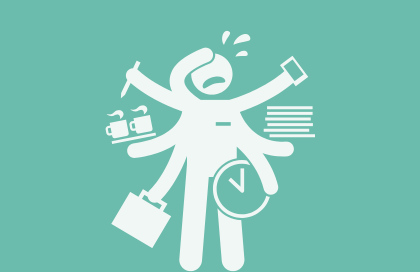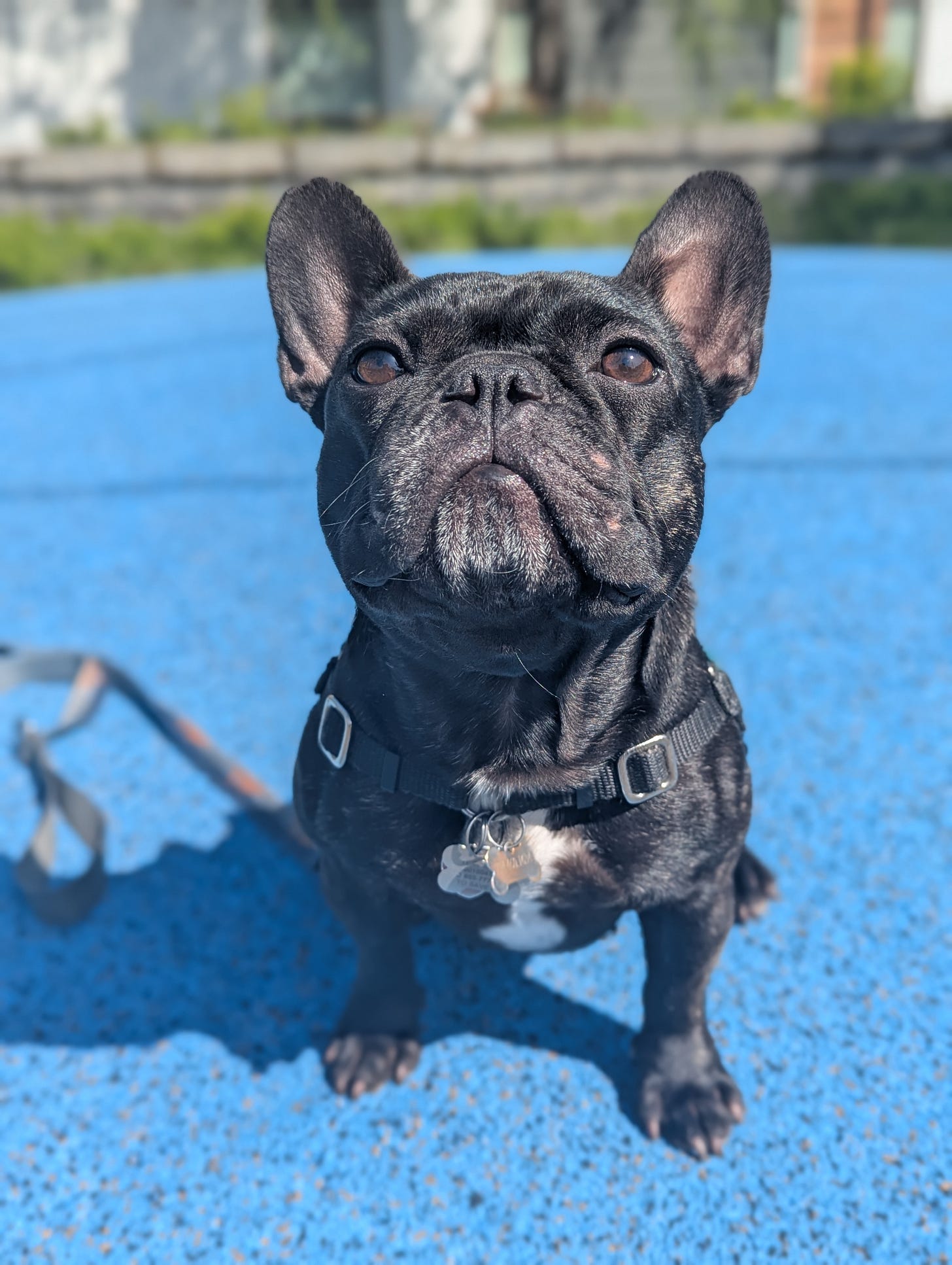Stop the Mental Chaos: How to Be Busy Without a Busy Mind
Why focusing on one thing at a time is your secret weapon against anxiety
Welcome to The Evolving Leader's Guide. Each week, I share one mindset, framework, or toolkit designed to help you become a more effective leader—so you can lead with confidence, inspire your team, and build a career you're proud of.
This week's tool: How to be busy but not stressed
You can be busy without having a busy mind.
I struggle with anxiety, and last night I was lying in bed with my stomach churning before a flight to visit my sister in South Bend.
It wasn't the flight itself that was making me anxious. It was everything else: the packing, the house prep, the mental load of it all. I was busy trying to solve for every what-if tomorrow all at once.
This kind of anxiety feels particularly frustrating because you can't solve it with logic. You can't reason your way out or build a framework to tackle it.
You're just stuck with it.
When your mind tries to do everything at once
Last year, I faced what felt like the ultimate test of my mental capacity.
I was staying at an Airbnb in San Jose with my dog Watson. My to-do list was brutal: pack everything up, drive to San Francisco, find safe parking for a car full of possessions, facilitate an all-day workshop, sneak Watson into said workshop, check into a hotel, park again, attend a business dinner, and prepare to drive cross-country the next morning.
I couldn’t mention Watson without sharing a picture of him.
That morning I woke up paralyzed with anxiety. I could barely move.
Then I had a realization: I wasn't just busy—I had a busy mind.
I was mentally trying to solve for everything that would happen over the next 24 hours all at once, when the only thing I needed to focus on at that moment was packing my car.
So that's what I did. I focused only on packing. Then once in the car, I focused solely on driving to the city. Then parking. Then the workshop.
One thing at a time.
The difference between being busy and having a busy mind
Flash forward to me lying in bed with pre-travel anxiety, and I recognized the pattern: yes I was busy, but what was really causing the anxiety was I had a busy mind.
I didn't need to worry about every moment of the next day's travel.
The only thing I had to do at that moment was sleep.
When I woke up, I'd need to get ready. Then close up the house. Then drive to the airport. Then navigate security.
Step by step.
A busy mind creates divided focus and unnecessary anxiety. It's like having too many tabs open on your computer—you drain your battery faster even though you can only actively use one tab at a time.
Even when you're multitasking, you're really just switching rapidly between individual tasks.
The science of a busy mind
That mental juggling act—trying to hold everything in your head at once—is what researchers call multitasking. Our brains simply don't work that way.
When you think you're multitasking, you're actually just ping-ponging between tasks. Each switch burns mental energy and creates a wake of stress behind it.
A University of Houston study revealed something surprising. Researchers analyzed people's facial expressions during multitasking and found they weren't just frustrated—they showed signs of "sadness mixed with fear." Your busy mind is actually making you sad.
The mental tax is steep. Stanford researchers discovered frequent multitaskers perform poorly at basic cognitive tasks. They can't filter out irrelevant information. Their working memory suffers. They struggle to pay attention to anything for long.
Your body gets in on it too. Multitasking spikes your stress hormones and jacks up your blood pressure. Keep it up long-term, and you're flirting with anxiety and depression.
And you aren’t even being more productive. Psychologists estimate task-switching burns up to 40% of your productive time. That's nearly half your day lost to the friction of your busy mind.
How great leaders stay focused
The most effective leaders I've worked with have mastered the skill of being busy without having a busy mind.
One leader I coached recently demonstrated this approach in action.
He was hired to build and grow a new sales development team from scratch. His to-do list seemed endless: write job descriptions, hire staff, train SDRs and managers, build processes, create cadences, establish connections to sales, develop forecasting models, design dashboards...and do it all yesterday.
When we first met, he was completely stressed out. He was constantly juggling everything in his head. As soon as he would get through reviewing his mental to-do list, his brain would start at the top and review it again in case he forgot something.
We worked together to create a phased approach. Rather than solve for everything at once, we grouped what v1, v2, and v3 of the SDR team would look like over 12 months. Then we broke it down further: what could he do this week? Today? In the next hour?
The next time we met, his whole demeanor had changed. He was calm, in control, and fully present during our session. He wasn't worried about the next month, week, or even the next meeting.
Yes, he was still ridiculously busy—this wasn't an exercise in saying no—but he had learned how not to have a busy mind. He realized that keeping all of that as mental load wasn't serving him and was making him a less effective leader.
How to practice present focus
Here's how to apply this skill in your own life:
Identify when your mind is racing ahead. Notice when you're feeling overwhelmed. Ask yourself: "Am I trying to solve for multiple future moments right now?"
Name the one thing that needs your attention now. What's the only thing you can actually do or influence in this moment? Focus exclusively on that.
Create physical boundaries between tasks. Close tabs on your computer that aren't relevant to your current task. Put your phone in another room. Clear your desk of unrelated papers.
Use time blocks on your calendar. Don't just block time for meetings—block focused time for specific tasks, and honor those blocks as you would any important appointment.
Practice a mental reset. When you catch your mind drifting to future tasks, gently bring it back with a phrase like "Not now. Right now I'm focusing on [current task]."
The key isn't doing less. It's focusing completely on one thing at a time.
The coach's challenge
This week, I challenge you to:
Identify one upcoming situation that's causing you anxiety. Write down everything that's on your mind about it.
Break that situation into distinct, sequential tasks. List them in order of execution.
Create a physical reminder (a note on your phone, a card in your wallet) that says: "Right now, focus only on [blank]" where you can fill in your current task.
Use this reminder when you feel anxiety building. Fill in what you're doing right now, and give yourself permission to focus only on that.
At the end of the week, reflect: Did focusing on one thing at a time reduce your anxiety? Did you actually accomplish more or less? How did it feel?
Remember: You can be busy without having a busy mind. What you can't handle is trying to mentally solve everything at once.







Needed this reminder! And wow, "sadness mixed with fear” — so wild to think about how our busy minds are making us sad.